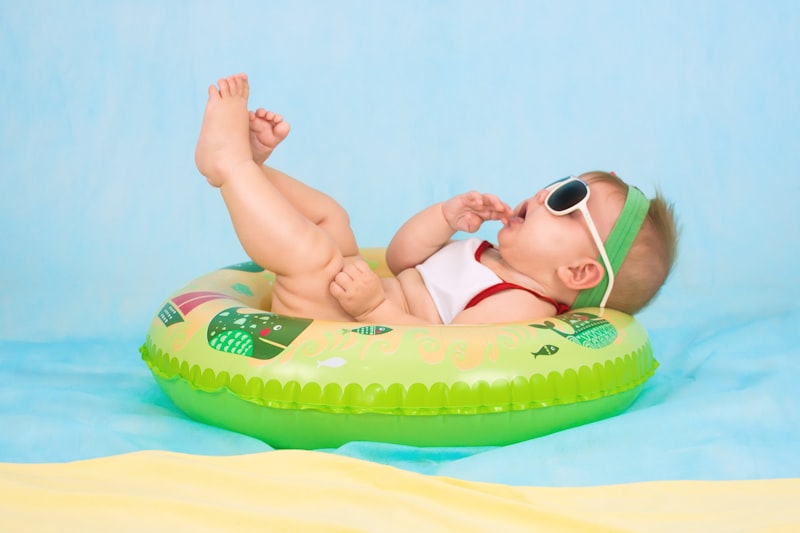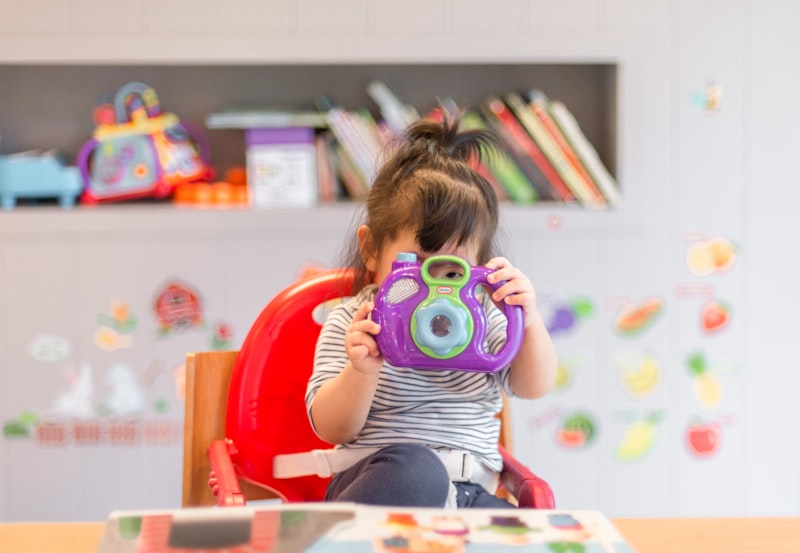One crucial area of research highlights the importance of early sensory experiences. Studies show that babies who engage in varied sensory activities—like touching different textures or hearing diverse sounds—develop stronger neural connections. It’s like giving their brains a workout that sets the stage for future learning and emotional development.
Language development is another fascinating area. Did you know that babies start learning language from birth? Research suggests that the more you talk, read, and sing to your baby, the richer their vocabulary and communication skills will be. Think of it as planting seeds of language that will grow into lush, robust skills later on.
Social interactions are equally vital. Babies who have regular, positive interactions with caregivers tend to develop better social skills and emotional regulation. It’s similar to how a baby’s laughter or a smile can be the sunlight that makes their social abilities blossom.
Motor skills also play a big role. Studies have found that babies who practice crawling and exploring their environment tend to develop stronger motor skills. This is like laying a solid foundation for their future physical abilities.
Groundbreaking Studies Unveil New Insights into Infant Brain Development
Research now reveals that an infant’s brain is a bustling metropolis, brimming with activity. Picture the brain as a construction site, with neurons as busy workers laying down the foundation. In the first few months of life, this construction site is in overdrive, rapidly forming connections and pathways. It’s like watching a city grow from a few buildings to a sprawling network of highways and skyscrapers in mere weeks.
What’s particularly astonishing is how these studies show the brain’s extraordinary adaptability. Think of it as a highly skilled sculptor chiseling away at a block of marble. Infants are absorbing a flood of sensory experiences—sounds, sights, and touches—that mold their brain architecture. For example, the study found that babies exposed to varied linguistic environments develop more robust language skills early on. This means that every conversation, every song, and even every coo and babble plays a crucial role in shaping their future communication abilities.
Additionally, the new research highlights how critical early interactions are. Engaging with your baby, whether through playful games or simple eye contact, isn’t just heartwarming; it’s brain-building. These interactions are like planting seeds that sprout into vital cognitive skills, laying the groundwork for problem-solving and emotional intelligence.
In essence, these groundbreaking studies underscore how the first few years of life are a pivotal period of rapid growth and development. Each moment and interaction contributes to building a foundation for future learning and emotional resilience, making early childhood a truly transformative time.
The Future of Baby Development: Top Research Trends to Watch in 2024
First up, we’re seeing a surge in research focused on the impact of early nutrition. Think of it as the foundation of a house; the better the base, the sturdier the structure. Experts are uncovering how specific nutrients and breastfeeding patterns influence long-term cognitive and emotional health. It’s not just about feeding babies; it’s about feeding their brains and emotional wellbeing.
Next, technology is playing a bigger role than ever. From wearable devices that monitor baby’s sleep patterns to AI-driven apps predicting developmental milestones, tech is making waves. Imagine having a personal baby guru in your pocket, offering real-time advice based on data gathered from your baby’s unique needs. That’s the future we’re heading toward.
Then there’s the growing interest in the science of early brain development. Researchers are delving into how environmental factors—like exposure to natural light and even the sounds of nature—affect brain growth. Picture this: a baby’s brain as a sponge, soaking up everything around them. The goal is to create environments that maximize this absorption for optimal development.
And don’t overlook the shift towards personalized parenting strategies. Think of this as customizing a playlist for your baby’s growth. With advancements in genetics and behavioral science, parents will soon have tailored recommendations to support their baby’s unique developmental journey.
Unlocking the Secrets of Early Childhood: Latest Findings in Baby Development
Ever wondered what’s going on inside that tiny, adorable head of a baby? The world of early childhood development is brimming with fascinating discoveries that are reshaping how we understand those first magical years. Research has recently unearthed incredible insights into how babies grow and learn, revealing that their brains are like sponges, soaking up information faster than we ever imagined.
For instance, did you know that babies start learning from the moment they’re born? New studies show that even newborns can recognize their mother’s voice and are already picking up on the rhythm and melody of language. It’s as if they’re pre-wired to soak up their surroundings, making every interaction a crucial piece of their developmental puzzle. Imagine a baby as a super-sleuth, gathering clues about the world through every coo, giggle, and gaze.

Furthermore, researchers are discovering that early experiences play a pivotal role in shaping a child’s cognitive abilities. It’s not just about how many words you say to them, but the quality of those interactions. Engaging with your baby through playful activities, like reading and singing, can significantly boost their brain development. Think of these interactions as seeds you’re planting; the more nurturing you provide, the more vibrant their future growth.

And here’s a mind-blower: recent findings suggest that even infants have a sense of morality. Studies indicate that babies can distinguish between helpful and unhelpful behaviors long before they can talk. It’s almost like they have an innate moral compass guiding them from the very start.
So, the next time you’re with a baby, remember that you’re part of a thrilling journey of discovery and growth. Each smile, each word, each game contributes to the incredible development happening right before your eyes.
How New Research is Shaping Our Understanding of Infant Growth and Learning
Ever wonder what’s going on in a baby’s brain as they explore the world around them? New research is unveiling fascinating insights into how infants grow and learn, changing everything we thought we knew. Imagine a baby’s brain as a sponge, soaking up every new experience, sound, and sight. Thanks to recent breakthroughs, we now understand that this “sponge” is far more active and sophisticated than previously believed.
Researchers have discovered that infants start absorbing information much earlier than we thought. For instance, studies show that babies can recognize their mother’s voice and even distinguish between different languages from just a few months old. It’s like they’re born with a superpower for learning, constantly picking up clues from their environment and using them to build a foundation for future knowledge.
But it doesn’t stop there. New findings reveal that the way babies interact with their surroundings—through play, exploration, and even sleep—plays a crucial role in their development. Think of it like planting seeds in a garden; every little interaction helps the baby’s brain grow stronger and more complex. For example, when babies play with toys or respond to facial expressions, they’re not just having fun—they’re actively learning about cause and effect, social cues, and problem-solving.
Moreover, advances in technology, such as brain imaging, allow scientists to delve deeper into understanding these processes. It’s like having a window into a baby’s mind, seeing firsthand how they process and integrate new information. This research is not just academic; it has real-world implications for how we approach early childhood education and parenting.
From Cradle to Milestones: Emerging Studies on Baby Development You Need to Know
Isn’t it amazing how babies evolve from tiny, dependent bundles into curious little explorers? The journey from cradle to milestones is a marvel, and recent studies are shedding new light on this incredible transformation. Imagine your baby’s brain as a sponge, soaking up experiences that shape their growth—sounds fascinating, right?
Recent research is revealing some jaw-dropping insights into baby development. For instance, did you know that early interactions with caregivers can significantly impact a baby’s social skills later in life? Studies show that responsive parenting, like talking and playing with your baby, helps develop crucial brain connections. It’s like planting seeds that blossom into strong social abilities.
Another intriguing area of research focuses on the role of sensory experiences in development. It turns out that sensory play—like exploring different textures or listening to various sounds—can actually boost cognitive skills. Think of it as giving your baby’s brain a workout; the more varied the experiences, the stronger their mental muscles become.
Motor skills are another hot topic. Emerging studies are showing that allowing babies to explore their environment at their own pace can enhance their physical abilities. For example, giving them tummy time not only strengthens their muscles but also improves their coordination. It’s as if their little bodies are gearing up for all the adventures they’ll embark on.
And let’s not forget about emotional development. New findings suggest that a baby’s emotional responses are influenced by their early relationships and environment. A warm, nurturing atmosphere can foster a sense of security and resilience, setting the stage for emotional well-being.
So, as you watch your baby grow from those first coos to walking and talking, remember that every little milestone is supported by a complex dance of factors. Keeping up with the latest research can offer valuable insights into nurturing their development and making every stage of their journey as enriching as possible.
The Evolution of Infant Care: Cutting-Edge Research in Baby Development
Imagine if your baby’s brain could tell you what it needs. Sounds far-fetched, right? Well, thanks to recent breakthroughs, we’re getting closer to understanding how babies develop and learn in those crucial early months. Researchers are diving deep into how infants’ brains grow, showing us that even newborns are incredibly perceptive. For example, studies have found that babies can recognize their mother’s voice from birth and that they’re surprisingly adept at picking up on emotions from facial expressions.
But the magic doesn’t stop there. Modern research is also spotlighting the impact of environment on baby development. Did you know that the way you interact with your baby can shape their cognitive and emotional growth? It’s true. Researchers are discovering that a rich, interactive environment—full of talk, play, and responsive caregiving—can significantly boost a baby’s development.
And let’s not forget about technology. Advanced tools like wearable baby monitors and interactive learning apps are making waves in the world of infant care. These innovations are not just cool gadgets; they’re giving parents real-time insights into their baby’s health and development, making it easier to keep those tiny humans on the right track.
So, if you’re a parent or soon-to-be one, buckle up. The realm of infant care is evolving faster than you can say “naptime,” thanks to groundbreaking research that’s all about understanding and nurturing the amazing journey of baby development.
What’s Next for Baby Development Research? Key Studies to Follow in the Coming Year
Another key area gaining momentum is the impact of nutrition on developmental milestones. Researchers are now exploring how various nutrients and feeding practices affect everything from language acquisition to motor skills. It’s almost like trying to find the perfect recipe for a child’s growth—one that balances ingredients to ensure they hit all the right developmental notes.
Moreover, technology is playing a huge role in this field. Cutting-edge studies are utilizing wearable tech to monitor babies’ health and development in real time. Imagine a high-tech Fitbit designed specifically for infants, providing insights that could lead to personalized developmental plans. This is not science fiction; it’s happening right now and it’s paving the way for more tailored approaches to nurturing our little ones.
Finally, look out for research that delves into the genetics of early childhood development. Scientists are decoding the DNA blueprint to uncover how genetic factors contribute to developmental trajectories. This could be a game-changer, offering new ways to understand and support children with unique developmental needs.
With these studies on the horizon, it’s an exhilarating time for anyone interested in the future of baby development. The next year promises to be packed with breakthroughs that could reshape how we support and nurture the youngest members of our society.
Frequently Asked Questions
Which Developmental Theories Are Most Relevant for Babies
Developmental theories relevant for babies include Jean Piaget’s sensorimotor stage, which focuses on how infants learn through sensory experiences and motor actions, and Lev Vygotsky’s social development theory, which emphasizes the role of social interaction and cultural context in cognitive development. Additionally, Erik Erikson’s psychosocial stages highlight the importance of trust and security in early development.
How Can I Track My Baby’s Development Progress
To monitor your baby’s growth, use milestone checklists to track physical, cognitive, and emotional development. Regular pediatric check-ups and developmental screenings also provide insights into your baby’s progress.
What Research Highlights Important Milestones for Babies
Research identifies key developmental milestones for babies, including rolling over, sitting up, crawling, and walking. These milestones are crucial for tracking a baby’s physical and cognitive growth, providing insights into their overall development.
What Are the Key Stages of Baby Development
Baby development progresses through key stages: sensory development (0-2 months), motor skills (2-6 months), social interactions (6-12 months), and language acquisition (12-24 months). Each stage is crucial for growth in physical, cognitive, and emotional areas.
How Can I Support My Baby’s Cognitive and Physical Growth
Encourage your baby’s cognitive and physical development by providing a stimulating environment. Engage in activities that involve sensory experiences, such as playing with age-appropriate toys and talking to your baby. Ensure they have ample tummy time to strengthen muscles and improve motor skills. Read to your baby and interact through games to boost their cognitive skills.


